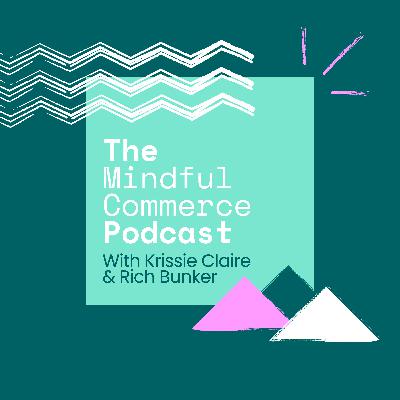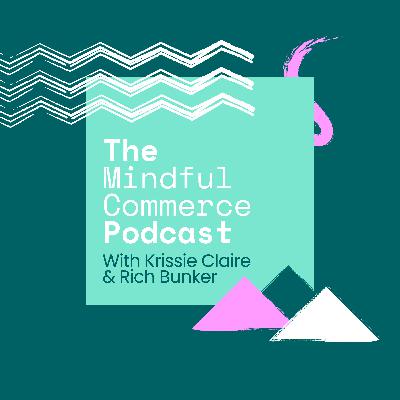#003: How environmentally friendly is the digital world? With Gerry McGovern
Description
Find us:
- Head to our community page to register & join the MindfulCommerce community as an expert, brand or merchant
- Instagram: @mindfulcommerce
- Facebook @MindfulCommerce
- Contact Us - info@mindfulcommerce.io
Where to find Gerry McGovern:
Gerry McGovern's website
Gerry McGovern's Books - Including World Wide Waste
Contact Gerry - gerry@gerrymcgovern.com
Sponsor:
This podcast is sponsored by Kollectify, a content marketing agency working specifically with Shopify solutions to successfully position and promote the app or agency
Show notes:
Krissie 0:00
Hello, and welcome to episode three of the Mindful Commerce podcast. I'm Krissie, and I'm your host for this episode. In this episode, I talk to a very inspiring man who knows all about sustainability on the web and his name is Gerry McGovern. Gerry has written a book called Worldwide Waste, which is all about how digital is killing our planet, and what we can do about it. In this episode, we talk about how the digital world is killing our planet and what Gerry thinks e-commerce brands and tech companies can do to combat the problem. Amongst many other topics, we discussed the ideal synergy of going back to localisation and community with a dash of innovative technology and less data collection. I hope you enjoy this episode. It's really fascinating. If you have any thoughts or comments, please feel free to email us at info@mindfulcommerce.io and all the details will be in the show notes. Enjoy.
Hi, Gerry, welcome to the MindfulCommerce podcast. Thank you for joining us today. Would you like to kick things off by just telling us your story and how you ended up where you are today?
Gerry McGovern 1:22
Okay, Krissie, and Thanks for the invite to be here. I used to many years ago, I was a freelance journalist back in there in the 90s, in the early 90s, and doing all sorts of different work for music and some, a little bit technology as well. And I came across the internet very early, maybe about '93 or so '94, sometime around then. And I thought wow, this is gonna, it's gonna change the world. And basically, from then on one way or another, either true, you know, for a while, I got commissioned to do a report for the Irish government around '94, about the future of the internet and society. And so that kept me busy for a while and then started some companies and you know, some of those companies went bust and had the whole, had the whole dot com bust experience. And then, you know, started writing books, this is my last book, worldwide waste is my eight. And traveling and doing workshops and working with clients and developed a methodology called top task, which is a kind of a prioritization system for, you know, really focusing on what matters, and that's been my main kind of work for the last 10 or 15 years is helping organisations implement top tasks projects.
Krissie 2:56
Okay, interesting, then, so when was it that you kind of realised that digital is not so great for our planet? So, obviously, if used in the right way, it's, it's great, but yeah, tell me a little bit about that.
Gerry McGovern 3:12
Yeah, really, only maybe two or three years ago, you know, because I always changed my computer every two years, changed my phone every two years. And, you know, I really had the impression that, that I was lucky to be working a digital like, I was, you know, watching, you know, the movements out there, and, you know, Greta Thunberg, and all those other wonderful young people, you know, really being passionate and idealistic and trying to make changes, and I kinda, I thought that's, that's nice to see. And, you know, isn't it great that, you know, where I'm, what I'm doing is, is helping them and, you know, but I taught in the back of my head, then I realised I was taking back over my careers since the 90s. And just, it kind of struck me that so many times in so many organisations, what we needed to do, specifically, say I did a lot of work for Internet's for a number of years. And that internets were just dumps and that to make them work, we nearly always had to delete 80 or 90% of the data and then systems, going into organisations and finding five or six or seven systems for training and, you know, all these duplications of systems that just got the sense of "Wow this is an incredible amount of waste in here", and nearly all the projects I've worked on where, you know, huge dumps that either the public websites, I remember, you know dealing with the US Department of Health and in one area there 200,000 pages, and they deleted 150,000 of them and nobody noticed. They didn't get a single inquiry. And I kept just seeing that. So that kinda was in the back of my head. And I thought, wow, you know, maybe digital listeners, as green as I, you know, Todd was and then when I started doing research and looking at e-waste, you know, recognising e-waste in particular, because, you know, I, I never really saw where these old computers went or cables or stuff like that. So it was really digging into the dark e-waste story that, you know, began to open up some talks that maybe digital is, is not nearly as green as I had been thinking as was over most of my career.
Krissie 6:01
Yeah, so e-waste in terms of like, you know, your laptops, your phones. And then like, do you know where they end up? Do they end up in landfill as well?
Gerry McGovern 6:12
They do most of them. See, what we have, you know, us in the rich countries, we've created a really nice system where our air is clean, and, you know, our environments are very clean. But we've essentially outsourced waste. So we go to poor countries, and we get them to manufacture the products very, very cheaply. And whatever waste is accrued there. And, you know, in the manufacturing process, or getting the raw materials, it's rarely, like a lot of these raw materials are for, they're called rare, rare materials, because they are rare. And they're difficult to find. And often they're found in virgin habitats, or, you know, in Western Africa, where the great apes, you know, there's certain type of rare, rare that's only found there. And, you know, in unusual places, that humans had not really been in insignificant numbers. So that's how we, you know, we suck all those raw materials out of certain countries then we give those materials to people in other more poor developing countries. And then we get our nice shiny products. And then two years later, we dumped them. But what happens is, they often get back to the very set back to the very same countries that the raw materials were dug up in. So we recycle less than 20%. And even recycling is incredibly crude, like a lot of like, somebody was telling me that in data centres, they just shred, they shred the servers that are working perfectly well, you know, every three or four years, they just shred them for either security or privacy, or they're worried that data might be accessed on them. So there's these perfectly working servers, because they've got this commitment to uptime, you know, they, they have to meet 99.9% uptime. So they don't want to take that statistical chance that the server will break. So even recycling is most recycling does not actually recycle in any real sense. And then the other 80% are put on big containers and, and are sent back to poor countries where they often end up in landfills, and they end up being burned, you know, with toxic fumes, so as to get out some gold or wood. So they're in open pits. So this, we never see these pictures when we see the Apple iPhone or the or the Samsung, we see the most beautiful things. But behind the scenes is a very ugly, very ugly world that we've created. But our world looks great, you know, because we outsource. We outsource all the nasty stuff to places that consumers won't see.
Krissie 9:18
That's crazy. That's really crazy. So would you say, so someone like me? Oh, what can I do? Can I just you know, don't upgrade my phone every year or two?
Gerry McGovern 9:32
Yeah, that's the single biggest thing. Like somebody did a study recently at a UK entity and they said that "If you kept your phone for five years versus two years, you essentially have the water issue in making devices" so they're making less phones, right. So you, you cut in half the amount of water required and the amount of co2. So keeping it between two and five years, has a huge makes a huge difference. Because, see, the problem with electronics is that electronics are very manufacturing intensive. So, the piece of electronics requires much more energy to create than a screwdriver or a knife, you know, or, you know, some other physical object. So there's a much higher intensity of energy. And as with energy is waste and often material. So these rare earth materials to get one tonne of Iridium or whatever it is, I can't remember they did, there's about 16 or 17 rare materials, well, you probably need to do 100 tonnes of mining. And often that mining is a kind of a pollutant, they add a kind of chemicals to actually filter out these materials. So, so the the very act of mining is very toxic in the environments that it actually happens in. And it creates these huge large kind of lakes because they use a lot of water












